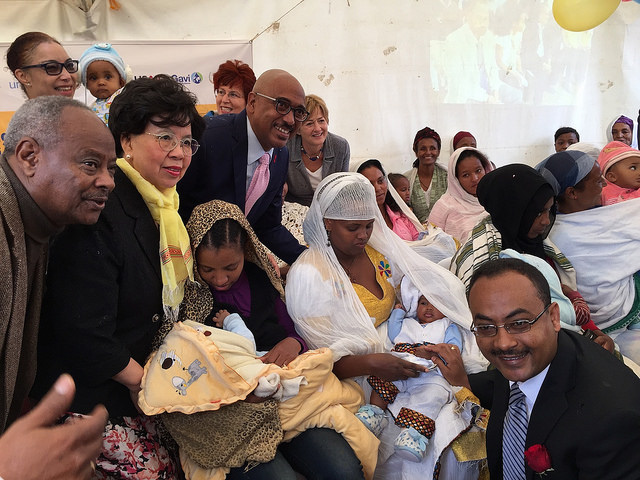By Becky John
In a joint press release on 14th July 2015 made available to Health Reporters Ethiopia and Africa have been commended in their efforts to sustain Polio Eradication.
The release was shared on behalf of the Ethiopian Minister of Health Dr Kesetebirhan Admasu, World Health Organization (WHO) Director General Dr Margaret Chan, The Global Alliance for Vaccines and Immunization (GAVI) Chief Executive Officer Dr Seth Berkley and UNICEF Deputy Executive Director Ms Yoka Brandt participated in a high levelpolio vaccination event at Selam Health Centre in Addis Ababa. Also present at the event were UNAIDS Executive Director Mr Michel Sidibe, US Ambassador Ms Patricia M. Haslach, Brazil Ambassador Mrs Isabel Cristina, President and CEO of PATH Dr Davis Steve, and Rotary National Polio Plus Committee Chairperson PDG Dr Tadesse Alemu as well as national and international EPI partners, health workers and mothers with their children.
“Strong leadership, political will and coordination are key to sustaining the gains made in interrupting polio transmission in Ethiopia and Africa,” said Dr Margaret Chan, commending Ethiopia’s aggressive response to the 2013 outbreak of wildpolio virus. “Horn of Africa countries should continue to immunize all at risk age groups until the threat drops to zero and eradication is achieved. And this is possible only through high quality immunization activities for all communities.”
The statement highlighted that when the wild polio virus outbreak in the Horn of Africa spread to Ethiopia in August 2013, the Government of Ethiopia intensified vigilance, surveillance and mass immunization campaigns, together with partners like WHO, UNICEF, USAID, the US Centers for Disease Control and Prevention (CDC) and Rotary International. Fifteen supplementary immunization campaigns were implemented with a focus on high risk areas. Cross-border coordination was heightened, with Horn of Africa countries coming together to implement synchronized response activities. It has been 18 months since the last case of wild polio virus was reported in Ethiopia, and 11 months since the last case in Africa.
Dr Kesetebirhan Admasu said, “We will focus on equity and quality for every child and mother in Ethiopia,” adding, “The Government of Ethiopia continues to be committed to eradicating polio from Ethiopia, and Africa.” He further affirmed that “The Government of Ethiopia will continue to engage communities for active participation in routine immunization, and will continue to build strong health partnerships.”
Ms Yoka Brandt, asserted, “Immunization, especially routine immunization, is a core priority within UNICEF, and it will continue to be. With the availability of new innovations, new vaccines, and new research and evidence, we can go fast and far.”
The partners observed that immunization is among the most cost effective interventions we can provide to our children. Yet, one in five children are not fully immunized worldwide. In Ethiopia and Africa, children in remote and marginalized communities are more likely to be missed. It is these same children that carry the highest risk of diseases that vaccines can prevent. Therefore partners must refine our strategies to reach these children and include them in our services. Reaching every community is an approach that strives at inclusion of all communities, especially the marginalized children, ensuring resources and services are available and monitoring is in place.
Dr Seth Berkley, highlighting GAVI’s commitment to strengthening routine immunization, said, “Strong routine immunization systems are a bedrock of healthy societies and are central to global plans for the eradication of polio. By working together, we are reaching more children than ever before with lifesaving vaccines and the GAVI partners are committed to supporting countries like Ethiopia to sustain and build on their progress on immunization.”




